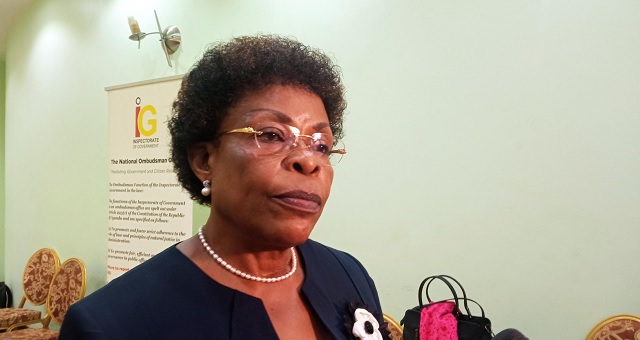
Kampala, Uganda | THE INDEPENDENT | The Inspector General of Government, Beti Kamya has announced that she will press ahead with conducting a lifestyle audit on government officials whose wealth does not match their known income.
Kamya’s declaration comes four months after Presient Yoweri Museveni cautioned her on the strategy, saying she should go slow as it could scare the corrupt officials from investing the stolen funds in the country and instead take the money abroad.
But Beti Kamya now says that it is very hard to catch the corrupt top government officials and so she has to pursue the life style audit approach.
“The big fish is slippery,” lamented Kamya who was meeting leaders from local government at Imperial Royale Hotel in Kampala.
The public often blames the Inspectorate of Government-IG for hunting down low ranking government officials engaged in less costly corruption tendencies yet there are top government officials often referred to as big fish who are corrupt and cause massive loss to the country.
Kamya says it’s hard to find evidence to pin top government officials for corruption because they operate through lower staff, they don’t sign on documents, sometimes discuss corruption deals from abroad and keep ‘their’ stolen money in offshore accounts. She says without any footprints left nor tangible evidence, they are not able to prosecute top government officials engaged in corruption.
According to a recent survey by the Inspectorate, the cost of corruption in Uganda has risen from 9.1 trillion Shillings in 2019 to 20 trillion Shillings annually. Half of this money is lost during procurement processes, under declaration of tax and utility costs among others. The other 10 trillion Shillings is lost due to absenteeism of civil servants especially health workers and teachers.
Kamya says that because it is hard to catch the big fish who engage in big corruption deals, the inspectorate has focused its efforts on the lifestyle audit to nab corrupt officials.
Under the lifestyle audit, the inspectorate shall, based on officer’s declarations, compare earnings of an official and their investment to see if they are in tandem.
Kamya says that for an official who earns 2 million shillings to have a huge investment, they should be able to explain the source of the money. Failure to do so, Kamya says the property of such officials shall be confiscated and sold to recover government funds.
Kamya hence asked LC5 chairpersons to help in fighting corruption in their areas, first by shunning the vice and secondly by reporting corruption. She says that the inspectorate shall no longer operate from board rooms but in the field, seeking out culprits and apprehending them.
The president of Uganda Local Government Association Richard Rwabihingizi said local governments are committed to fighting corruption but are under-facilitated and less empowered. He says that on top of a small salary, they are not facilitated to go to the field to monitor different government projects in their jurisdictions.
Government promised to give motorcycles to some local government officials but only a few districts have received them. Rwabihingizi also says that services that should be decentralized like procurement, aren’t and hence done by central government leaving out local governments.
This, Rwabihingizi says affects their ability to fight corruption involved in a procurement process at a higher level. He adds that contractors, after paying hard to secure contracts, are too arrogant to listen to local government officials since they even have godfathers at the higher levels.
The State Minister for Local Government Victoria Rusoke Businge urged local government chairpersons to use their offices to fight corruption. She noted that some of them are the big fish and that they come to her office begging that Chief Administrative Officers -CAOs in their areas be transferred on allegations that they are non-performers when actually the main reason is that they have fallen out due to money deals.
She also asked them to use the available resources to monitor government projects as government plans to fund and facilitate them better.
The Inspectorate is involving different stakeholders to ensure that they save the 20 trillion Shillings lost to corruption annually. There is also a plan to include anti-corruption studies in the school curriculum such that children are taught about it at an early age for them to be able to detect, avoid and report any corruption.
*****
URN
 The Independent Uganda: You get the Truth we Pay the Price
The Independent Uganda: You get the Truth we Pay the Price





